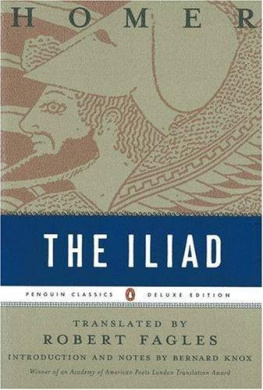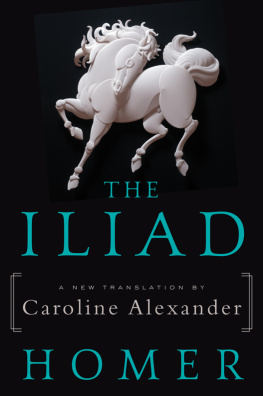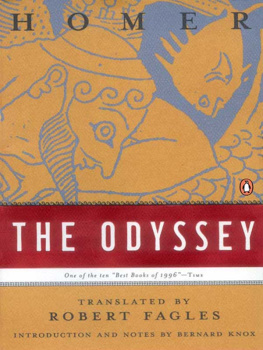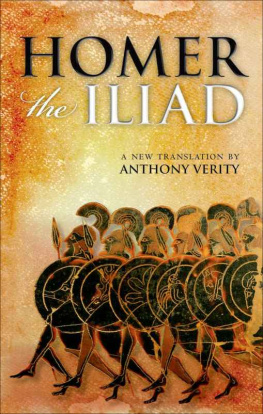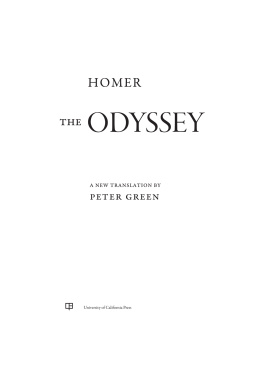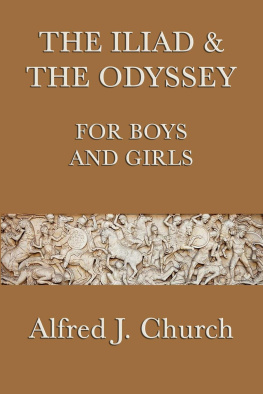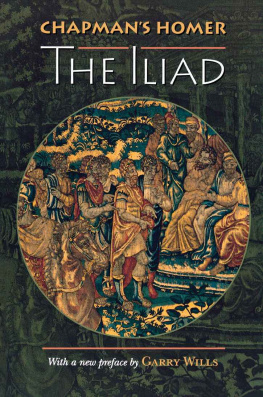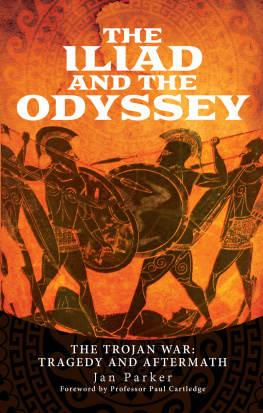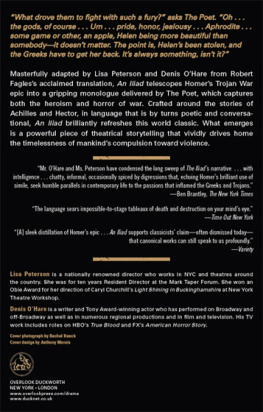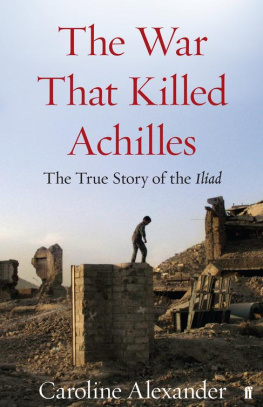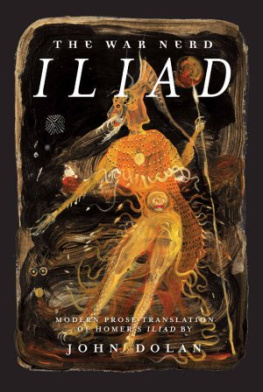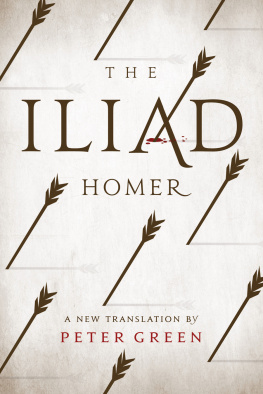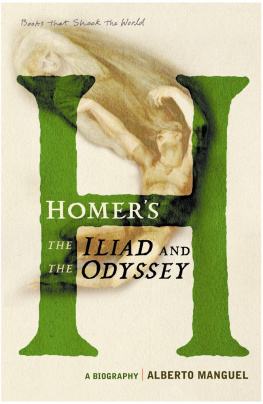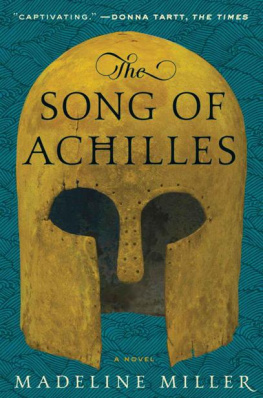Table of Contents
The Iliad
HOMER
TRANSLATED BY
Robert Fagles
INTRODUCTION AND NOTES BY
BERNARD KNOX
Copyright Robert Fagles. 1990
ISBN 0-670-83510-2
To the memory of my father and my mother and for Lynne, Katya and Nina
humeis gar theai este, pareste te, iste te panta, hemeis de kleos oion akouomen oude ti idmen
TRANSLATOR'S PREFACE
Homer makes us Hearers, Pope has said, and Virgil leaves us Readers.
So the great translator of Homer, no doubt unknowingly, set at odds the claims of an oral tradition and those of a literary one, as we would call the two traditions now. Homer's work is a performance, even in part a musical event. Perhaps that is the source of his speed, directness and simplicity that Matthew Arnold heard and his nobility too, elusive yet undeniable, that Arnold chased but never really caught. Surely it is a major source of Homer's energy, the loft and carry of his imagination that sweeps along the listener together with the performer. For there is something powerful in his song, that unequal'd Fire and Rapture Pope again which is so forcible in Homer, that no Man of a true Poetical Spirit is Master of himself while he experiences the Iliad. In Homer, and in him only, it burns every where clearly, and every where irresistibly.
But it also brings to light the Homeric Question facing all translators: How to convey the power of his performance in the medium of writing? Homer makes us Hearers, and Virgil leaves us Readers.
Yet the contrast may be too extreme. Virgil the writer was certainly no stranger to recitation. Homer the performer, as the Introduction speculates, may have known a rudimentary form of writing. And writing may have lent his work some qualities we associate with texts in general idiosyncrasies at times, and pungency and wit and with the Iliad in particular, its architectonics, its magnificent scale, and the figure of Achilles. But even if Homer never used an alphabet himself, he now seems less the creature of an oral tradition whom Milman Parry discovered, and more and more its master, as envisioned by Parry's son, Adam. Homer the brilliant improviser deployed its stock, inherited features with all the individual talent he could muster. Never more so, in fact, than in his use of the fixed and formulaic, frequently repeated phrase. Not only is Homer often less formulaic, but the formulas themselves are often more resonant, more apt and telling in their contexts than the hard Parryites had argued for at first. So the original form of Homer's work, while a far cry from a work of literature as we know it now, is not exactly a song either, pure and simple. It may be more the record of a song, building over the poet's lifetime perhaps, or what Marianne Moore would call a simulacrum of spontaneity.
Obviously at a far remove from Homer, in this translation I have tried to find a middle ground (and not a no man's land, if I can help it) between the features of his performance and the expectations of a con-temporary reader. Not a line-for-line translation, my version of the Iliad is, I hope, neither so literal in rendering Homer's language as to cramp and distort my own though I want to convey as much of what he says as possible nor so literary as to brake his energy, his forward drive though I want my work to be literate, with any luck. For the more literal approach would seem to be too little English, and the more literary seems too little Greek. I have tried to find a cross between the two, a modern English Homer.
Of course it is a risky business, stating what one has tried to do or, worse, the principles one has used (petards that will probably hoist the writer later). But a word or two of explanation seems in order, and the first refers to the more fixed and formulaic parts of Homer. I have treated them in a flexible, discretionary way, not incompatible with Homer's way, I think especially when his formulas are functional as well as fixed while also answering to the ways we read today. It is a matter of riding easy in the harness, as Robert Frost once said of democracy, and my practice ranges from the pliant to the strict. With one of the most frequently repeated phrases, for example the line that introduces individual speeches I have been the freest, trying to anticipate the speaker's nuance of the moment yet retaining, at least, the ritual of introductory words for every speech. When Homer introduces a speech of winged words,
However, I rarely if ever omit that well-known phrase, though I like the flight of the words to vary, with a quick burst at times and a longer drift at others, according to what a character has to say. And so with Hector's flashing helmet, in the epithet that clings to Hector's name: I like to ally its gleaming with his actions, now nodding his head in conversation, now rushing headlong into the front lines. But a flashing helmet it is, again and again, and not only to make his own career appear more meteoric and abruptly snuffed out but also to support a chain of tragic ironies throughout the poem. For the flashing helmet Hector's own at first is soon replaced by the one he strips from Patroclus When he kills him: the helmet of Achilles. So as prophecy would have it, when Achilles destroys Hector in revenge he must destroy himself as well, his flashing mirror-image embodied in his victim, and the helmet he will wear, fire-new and forged by Hephaestus, flashes like the helmet of Ares when Achilles closes for the kill (Book 20.45,22.158).1 The more the epithet recurs, in short, the more its power can recoil. And the inevitability of its recoil for Hector is further stressed by a repeated passage in the Greek repeated verbatim in the English version. The words that describe the death of Patroclus are exactly those that describe the death of Hector six books later (16.1001-5, 22.425-29): the first death, both in the mind of Achilles the avenger and in the style of his maker, will have served as warrant for the second. All in all, then, I have tried for repetition with a difference when variation seems useful, repetition with a grim insistence when the scales of Zeus, the Homeric moral balance, is at issue.
Turning briefly to Homer's metrics: though my way is more remote, it is also meant to occupy a flexible middle ground, here between his hexameter line his ear, ear for the sea-surge, as Pound describes it and a tighter, native English line. If, as the Introduction claims, the strongest weapon in Homer's poetic arsenal is variety within a metrical norm, the translation opts for a freer give-and-take between the two, and one that offers a good deal more variety than uniformity. Working from a loose five- or six-beat line but inclining more to six, I expand at times to seven beats to imply the big reach of a simile or some vehement outburst in discourse or the pitched fury of combat on the field or contract at times to three, to give a point in speech or action sharper stress. Such interplay between variety and norm results, I suppose, from a kind of tug-of-war peculiar to translation, between trying to encapsulate the meaning of the Greek on the one hand and trying to find a cadence for one's English on the other, yet joining hands, if possible, to make a line of verse. I hope it results, at any rate, not only in giving my own language a slight stretching it may need and sometimes gets these days, but also in lending Homer the sort of range in rhythm, pace and tone that may make an Iliad engaging to a modern reader. It may be a way as well, again at a far remove, of trying to suggest the tension in Homer's metrics, his blend of mass and movement both so much ongkos yet so much grace and speed.
In aiming for these and other objectives in a version of the Iliad, I have had many kinds of help. The greatest has come from my collaborator, Bernard Knox, whom I would rather call a comrade. Not only has he written the Introduction and Notes to the translation but he has commented on my drafts for several years. And when I leaf through those pages now, his commentary seems to ring my typescript so completely that I might be looking at a worse-for-wear, dog-eared man-uscript encircled by a scholiast's remarks. Or is it something of a battle-map as well? The vulnerable lines at the center are shored up by a combat-tested ally, whose squads reinforce the weakest sectors and who deciphers Homer's order of the day and tells a raw recruit what war the movements of armies and the sentiments of soldiers is all about. And more, what tragedy in this, the first tragedy really means. In Book 9 of the Iliad old Phoenix calls for a man of words and a man of action too. My good fortune has been to work with such a man.

